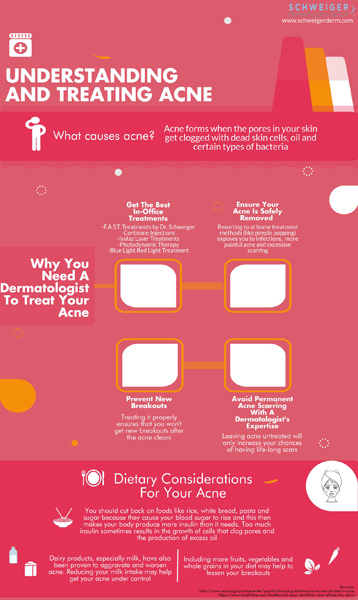Misconceptions And Realities Concerning Acne: Debunking Common Misconceptions
Misconceptions And Realities Concerning Acne: Debunking Common Misconceptions
Blog Article
regen labs -Webb Watts
You might believe that indulging in chocolate or greasy foods is the source of your acne, yet that's simply among numerous misconceptions swirling around this common skin disease. In fact, acne primarily comes from stopped up hair follicles, not your last dessert. Misconceptions like these can lead you to take on inefficient skin care methods that may even worsen your circumstance. As you navigate the realities behind acne, you'll discover insights that might change your strategy to skincare and aid you attain clearer skin. So, what actually exists under the surface?
Common Myths About Acne
When it involves acne, many individuals count on typical misconceptions that can lead to confusion and disappointment. One prevalent misconception is that eating chocolate or oily foods causes acne. While diet can influence skin health, the direct link in between particular foods and acne isn't as well-defined as lots of assume.
Another usual mistaken belief is that you need to scrub your face strongly to improve breakouts. In truth, aggressive scrubbing can irritate your skin and get worse acne.
You might likewise think that acne only affects teens, but adults can experience it too, usually as a result of hormone adjustments or tension. Some individuals assume that tanning can improve acne, but sun direct exposure can actually cause skin damage and aggravate breakouts in the long run.
Last but not least, several believe that making use of extreme products will certainly remove acne rapidly. Nevertheless, hop over to these guys can remove your skin of its all-natural oils, resulting in enhanced inflammation and even more breakouts.
Scientific Facts Behind Acne
Comprehending the clinical facts behind acne can encourage you to tackle this typical skin problem better.
Acne happens when hair roots become obstructed with oil, dead skin cells, and bacteria. https://cold-lser-therapy67132.elbloglibre.com/32164816/personalized-acne-treatment-strategies-customizing-solutions-for-your-skin begins with an overproduction of sebum, the oil your skin normally generates. Hormonal changes, specifically during adolescence or menstrual cycle, can activate this excess oil.
Germs referred to as Propionibacterium acnes thrive in these clogged pores, leading to swelling. When your immune system responds, it can create inflammation and swelling, resulting in those pesky acnes or cysts.
Genes also play a role; if your moms and dads had acne, you may be much more susceptible to it.
Diet regimen and tension degrees can influence acne also, however research is still developing in these areas. While enjoying oily foods won't straight cause outbreaks, a well balanced diet can sustain your skin wellness.
Furthermore, managing stress can reduce hormonal variations that might aggravate acne.
Tips for Managing Acne
Managing acne efficiently calls for a combination of day-to-day skin care behaviors and way of living modifications. Beginning by developing a constant skincare regimen. Cleanse your face two times a day with a gentle, non-comedogenic cleanser to eliminate dirt and excess oil. Avoid rubbing too hard, as this can irritate your skin and worsen acne.
Next off, integrate items consisting of salicylic acid or benzoyl peroxide to aid avoid outbreaks. Always follow up with a light-weight, oil-free moisturizer to maintain your skin hydrated. Do not fail to remember sunscreen; select non-comedogenic alternatives to shield your skin from UV damages without blocking pores.
Beyond skin care, pay attention to your diet regimen. Limit sugary and greasy foods, and concentrate on fruits, vegetables, and whole grains. Staying hydrated is critical, so drink plenty of water throughout the day.
In addition, handle tension via tasks like yoga, meditation, or workout, as stress can trigger outbreaks.
Finally, stay clear of picking or popping acnes. This can lead to scarring and more swelling. If your acne continues, seek advice from a skin doctor for customized treatment options.
Conclusion
To conclude, it's essential to different fact from fiction when it comes to acne. By unmasking typical misconceptions, you can better recognize your skin and make informed options for your skincare regimen. So, why continue to count on obsolete concepts when the fact can equip you? Embrace much healthier practices, focus on gentle cleaning, and keep in mind that taking care of acne is a journey. With the ideal knowledge, you're one action more detailed to clearer, much healthier skin.
